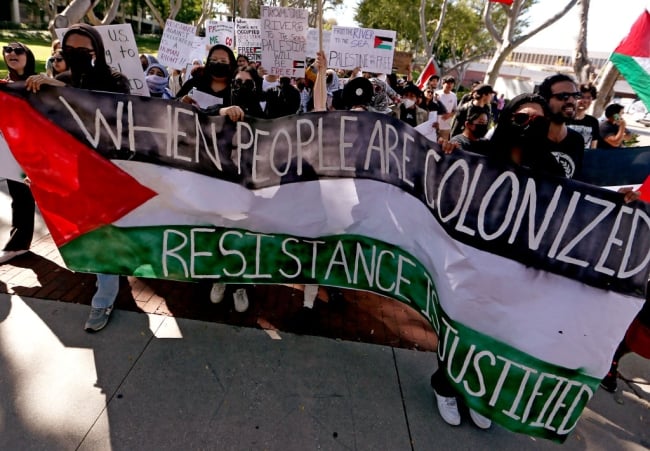You have /5 articles left.
Sign up for a free account or log in.

California State University, Long Beach, students held a rally in support of Palestinians Oct. 10.
Luis Sinco/Los Angeles Times/Getty Images
Students shout “by any means necessary” and “from the river to the sea” during anti-Israeli, pro-Palestinian protests on college campuses across the United States. These chants expose the failures of higher education. On the one hand, if students chant “by any means necessary” and “from the river to the sea” ignorantly, while not realizing that these are threats of violence, then we have failed to teach them the historical and philosophical context they need in order to understand these chants. On the other hand, if students chant “by any means necessary” and “from the river to the sea” knowingly, while embracing violence against others, then we have failed to teach them tolerance and nonviolence. Either way, the Israel-Hamas war has put the moral failures of higher education on full display.
On the one hand, it may be the case that students who chant “by any means necessary” and “from the river to the sea” are doing so while being ignorant of the historical and philosophical context in which these threats of violence originated. Take “by any means necessary.” In the play Dirty Hands (1948), written by the philosopher Jean-Paul Sartre, the phrase is used to call for a violent war to eradicate social class. (Some translations of the play include the phrase “every means at hand.”)
In “Why We Use Violence” (1960), the philosopher Frantz Fanon’s address to the Accra Positive Action Conference, the phrase is used to justify acts of violence by Algerians against colonial powers. (Sartre also endorsed counterviolence in his preface to Fanon’s 1961 book, The Wretched of the Earth.) And when Malcolm X used the phrase in 1964 at the founding rally of the Organization of Afro-American Unity, he was endorsing violence as a legitimate tactic in the fight for civil rights.
Now take “from the river to the sea.” College students may not know what this phrase really means or even which river and sea are referenced. This phrase appears in Hamas’s charter to describe the “Land of Palestine” as “the land and the home of the Palestinian people” and “an Arab Islamic land,” thereby categorically denying any Jewish rights to inhabit the land.
It also appeared in the Likud’s political platform from 1977 to call for Jewish-Israeli sovereignty over the land between the Mediterranean Sea and the Jordan River, thereby categorically denying any Palestinian rights to inhabit the land. Endorsed by either side, then, “from the river to the sea” leaves no room for a peaceful and nonviolent resolution of the conflict.
If our students are ignorant of the historical and philosophical context of threats of violence, such as “by any means necessary” and “from the river to the sea,” yet they enthusiastically chant them during anti-Israel, pro-Palestine protests on college campuses, then higher education has failed them. As educators, we have failed to provide our students with the historical and philosophical resources required for understanding the Israeli-Palestinian conflict—or any other current conflict, for that matter. As the historian David C. McCullough once said, “History is a guide to navigation in perilous times.”
On the other hand, it may be the case that students are aware of the historical and philosophical context of threats of violence, such as “by any means necessary” and “from the river to the sea,” but they willingly choose to embrace violence over nonviolence. In that case, higher education has failed them, too. As educators, we have failed to teach our students that nonviolence, as practiced by the likes of Mahatma Gandhi and Martin Luther King Jr., is morally superior to violence in the pursuit of justice.
We have failed to teach them that a violent struggle against injustice is cowardly, whereas a nonviolent struggle is courageous. We have failed to teach them that violence only leads to more violence, whereas nonviolence leads to redemption and reconciliation. We have failed to teach them that the enemy of justice is injustice, not people. We have failed to teach them that violence is the way of hate, whereas nonviolence is the way of love. We have failed to teach them that resorting to violence is a sign of desperation, whereas a nonviolent fight against injustice shows faith that justice will prevail.
Whatever the moral failure of higher education is, be it the former or the latter, our students deserve better. As educators, we must do better for our students’ sake. We cannot let misinformation on TikTok inform their judgments about the Israel-Hamas war. We must step in and educate them about the current war and the broader conflict in the region.




